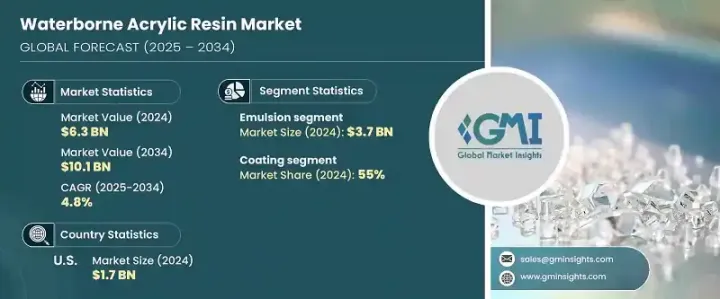
세계의 수성 아크릴 수지 시장은 2024년에 63억 달러로 평가되었고, 2025년부터 2034년에 걸쳐 4.8%의 연평균 성장률(CAGR)로 성장할 것으로 예측됩니다.
자동차, 건설, 포장 등 다양한 산업 분야에서 친환경 코팅에 대한 수요가 급증하는 것이 이러한 성장의 주요 원동력입니다. 수성 아크릴 수지는 환경 규제가 강화되고 지속 가능한 친환경 솔루션에 대한 소비자 수요가 증가함에 따라 휘발성 유기 화합물(VOC) 배출이 적어 점점 더 많이 찾고 있습니다. 이러한 수지는 성능 저하 없이 환경 기준을 충족하고자 하는 제조업체에게 적합한 선택입니다. 수성 제형의 지속적인 발전으로 이러한 수지는 기존의 솔벤트 기반 수지에 비해 향상된 안정성, 우수한 접착력, 내후성을 제공합니다. 수성 시스템으로의 이러한 변화는 지속 가능성, 혁신 및 생산 효율성에 대한 업계의 노력을 강조합니다.

수성 아크릴 수지 시장은 유형별로 용액, 우레탄-아크릴, 에멀젼 및 기타 제형으로 분류됩니다. 에멀젼 기반 수지 부문은 2024년에 37억 달러의 매출을 올렸으며 2034년에는 59억 달러에 달할 것으로 예상됩니다. 우수한 물 안정성으로 잘 알려진 에멀젼은 취급, 보관 및 운송을 간소화합니다. 뛰어난 필름 형성 특성으로 페인트, 코팅, 접착제, 실란트 등 까다로운 응용 분야에서 탁월한 접착력, 오래 지속되는 내구성, 우수한 성능을 제공합니다. 이러한 다용도성과 사용 편의성 덕분에 에멀젼 기반 수지는 다양한 분야에서 널리 사용되고 있으며, 시장에서 널리 채택되고 있습니다.
| 시장 범위 | |
|---|---|
| 시작 연도 | 2024년 |
| 예측 연도 | 2025-2034년 |
| 시작 금액 | 63억 달러 |
| 예측 금액 | 101억 달러 |
| CAGR | 4.8% |
용도별로는 코팅 부문이 2024년 점유율의 55%를 차지하며 시장을 지배했습니다. 코팅용 수성 아크릴 수지에 대한 수요는 다양한 피착재에 대한 탁월한 접착력과 내구성으로 인해 지속적으로 증가하고 있습니다. 특히 자동차, 건축 및 산업용 코팅에서 빠르게 건조되고 탄력 있는 필름을 형성하는 능력은 그 매력을 더욱 높여줍니다. 또한 VOC 함량이 낮기 때문에 특히 엄격한 지침이 적용되는 분야에서 환경 규정을 준수할 수 있어 코팅 분야에서 수성 수지의 인기가 더욱 높아지고 있습니다.
미국의 수성 아크릴 수지 시장은 2024년에 17억 달러 규모를 형성했는데, 이는 미국 환경보호청(EPA)의 코팅 및 접착제 내 VOC 규제와 같은 환경 규제 강화에 힘입은 결과입니다. 건설, 자동차, 포장 산업에서 지속가능성을 추구하면서 수성 수지에 대한 수요가 크게 증가했습니다. 또한 친환경 건축 인증과 지속 가능한 건설 관행의 채택이 증가하면서 친환경 건축용 코팅제에 대한 수요가 더욱 가속화되었습니다. 미국 시장의 저배출 제품에 대한 강조와 강력한 규제 환경은 수성 아크릴 수지 시장의 미래를 계속해서 형성하고 있습니다.
The Global Waterborne Acrylic Resin Market reached USD 6.3 billion in 2024 and is expected to expand at a robust CAGR of 4.8% from 2025 to 2034. The surge in demand for eco-friendly coatings across a wide range of industries, such as automotive, construction, and packaging, is a major driver behind this growth. Waterborne acrylic resins are increasingly sought after for their low volatile organic compound (VOC) emissions, aligning with tightening environmental regulations and growing consumer demand for sustainable, green solutions. These resins are a go-to choice for manufacturers looking to meet environmental standards without compromising performance. With ongoing advancements in waterborne formulations, these resins offer enhanced stability, superior adhesion, and greater resistance to weathering compared to traditional solvent-based resins. This shift toward waterborne systems underscores the industry's commitment to sustainability, innovation, and efficiency in production.

By type, the waterborne acrylic resin market is segmented into solution, urethane-acrylic, emulsion, and other formulations. The emulsion-based resins segment generated USD 3.7 billion in 2024 and is projected to reach USD 5.9 billion by 2034. Known for their excellent water stability, emulsions simplify handling, storage, and transportation. Their outstanding film-forming properties deliver exceptional adhesion, long-lasting durability, and superior performance in demanding applications like paints, coatings, adhesives, and sealants. This versatility and ease of use make emulsion-based resins a popular choice across a range of sectors, driving their widespread adoption in the market.
| Market Scope | |
|---|---|
| Start Year | 2024 |
| Forecast Year | 2025-2034 |
| Start Value | $6.3 Billion |
| Forecast Value | $10.1 Billion |
| CAGR | 4.8% |
In terms of application, the coatings segment dominated the market, accounting for 55% of the share in 2024. The demand for waterborne acrylic resins in coatings continues to rise, primarily due to their exceptional adhesion and durability on diverse substrates. Their ability to form a fast-drying, resilient film enhances their appeal, especially in coatings for automotive, architectural, and industrial applications. Furthermore, the low VOC content ensures compliance with environmental regulations, particularly in areas with strict guidelines, further boosting the popularity of waterborne resins in the coatings sector.
In the United States, the waterborne acrylic resin market generated USD 1.7 billion in 2024, fueled by increasing environmental regulations such as the U.S. Environmental Protection Agency's (EPA) restrictions on VOCs in coatings and adhesives. The push for sustainability in the construction, automotive, and packaging industries has significantly raised demand for waterborne resins. Additionally, the growing adoption of green building certifications and sustainable construction practices has further accelerated the demand for eco-friendly architectural coatings. The U.S. market's emphasis on low-emission products and its strong regulatory environment continue to shape the future of the waterborne acrylic resin market.